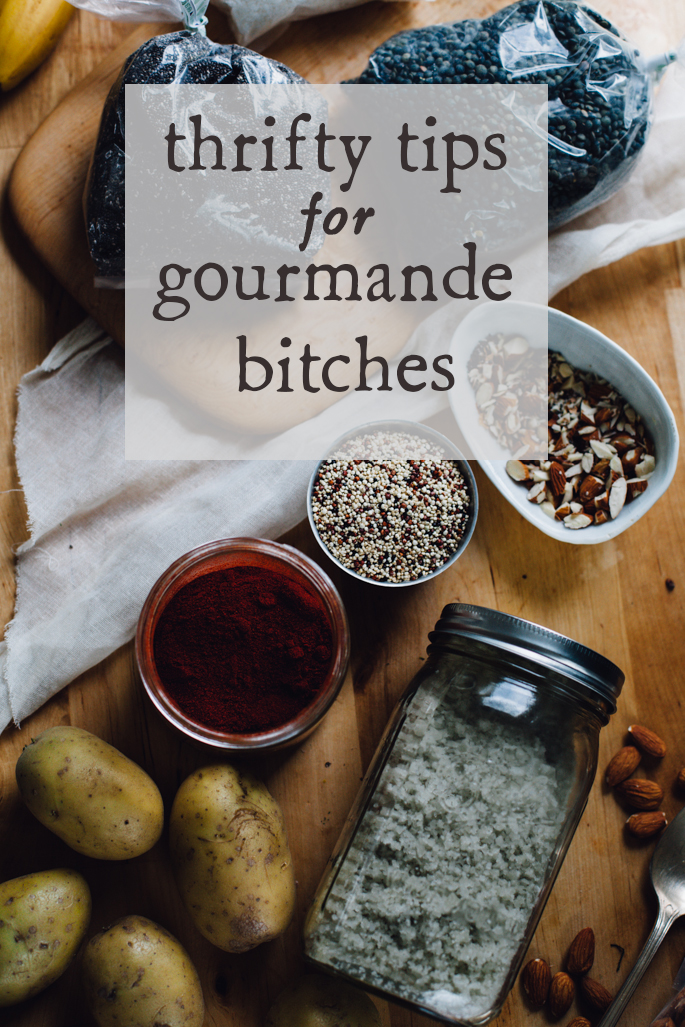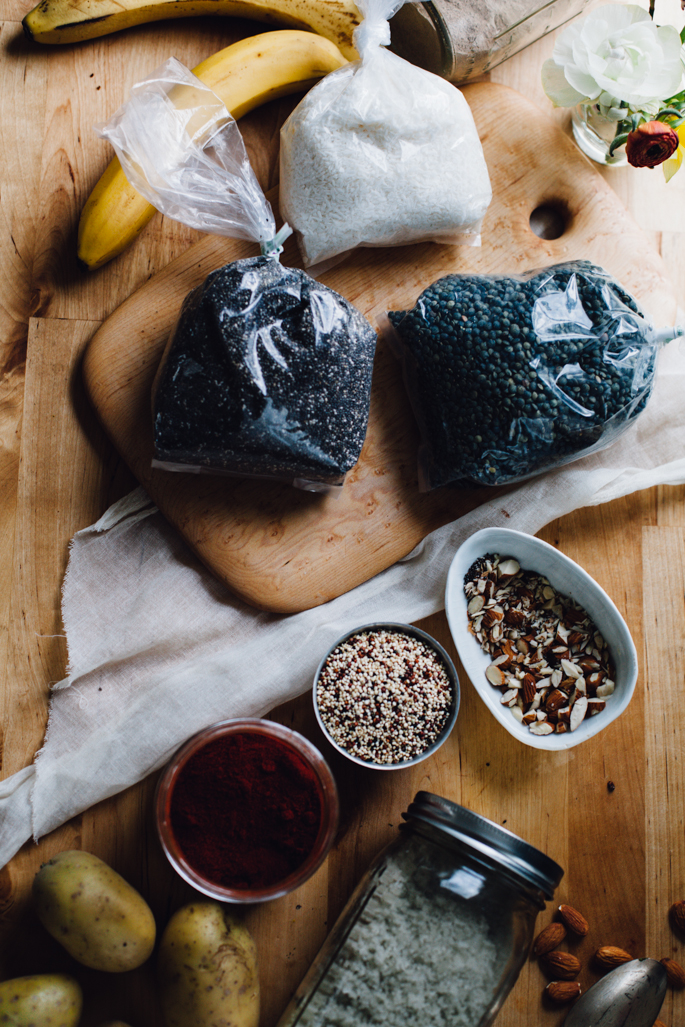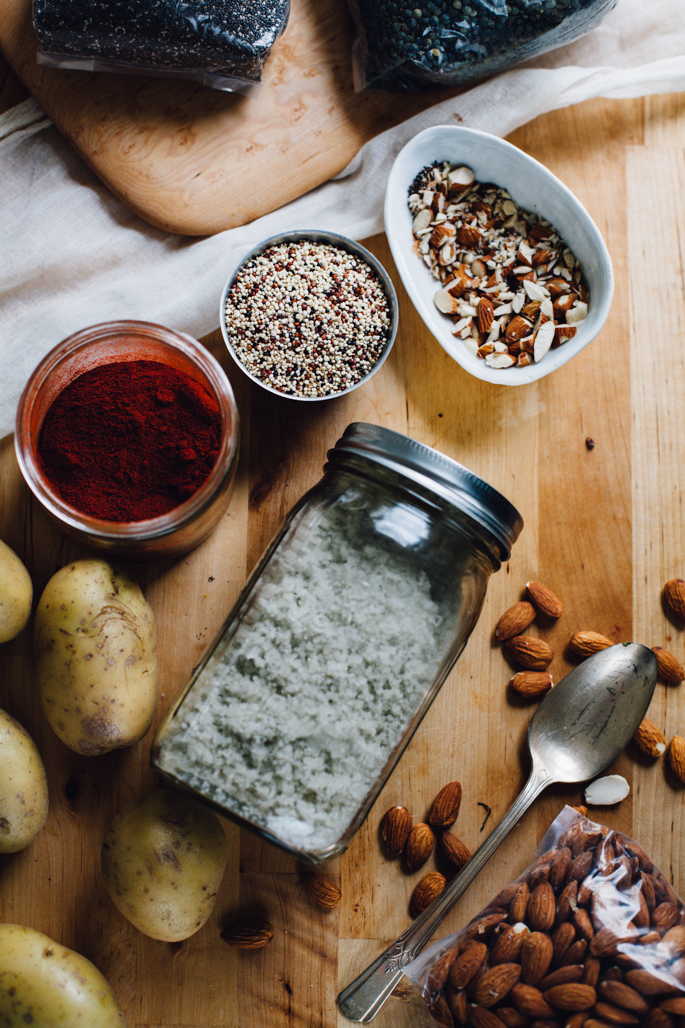How I Eat Gourmet Quality Food On a Minimalist Budget
I said it. I'm a gourmande bitch. But like a power bitch not an evil, fuming, witch bitch. Like a strong, present, feminist bitch wearing high heels and eating a plate of steaming gnocchi in a butternut squash sauce. You know... THAT kind. What I really mean is I refuse to compromise on the quality of my food. I want my meals to feel and taste luxurious. I want to eat food that makes me feel vibrant and nourished. I want food that doesn't have chemicals in it, that was produced ethically, that's bright and shiny and luscious.
But I've been think a lot about saving lately. Specifically, I've let a cartoon rain cloud form above my head over my Student Loan Debt. Which gets me formulating schemes to get out of it quickly. Which gets me thinking about all of the things I can save on. And of course... food is the first thing that comes to mind.
But, surprisingly, I don't really spend that much on food. It just FEELS like I do. I eat really well on the cheap. Not that I've always done that! I've cultivated money saving muscle memory over the last couple of years -- which I started to do after a painful period of working my ass off basically just to feed myself. That muscle memory comes partly from working in the Organic foods industry and getting inside tips from that world and partly from cultivating a financially minimalist lifestyle (spend less, live more).
So... today I'm sharing my tips with you. Because us bitches have got to stick together (and help each other become more financially free!).
1. Buy in bulk onAmazon. Buying premium spices and dry staple foods in small amounts at Whole Foods makes no sense. You might as well be taking a hammer to your bank account and giving your doubloons to train hoppers. I buy certain things in bulk on Amazon. I hate how much packaging I have to deal with, but thankfully it's mostly recyclable. On Amazon I usually go for grains and flours from Bob's Red Mill, sweeteners from Wholesome Sweeteners, and spices from Frontier. I buy Superfoods (chia, goji berries, hemp hearts, etc.) from a variety of Amazon sellers, usually the Best Sellers in each respective category (based on price and quality)!
2. Shop local and in-season. And mostly what I mean by this is... go to farmers markets! Buying from farmers markets, and directly from farmers, can be a real money saver. Not to mention that in-season produce -- fruit especially -- is far more affordable than out-of-season eats. Most farmers sell their fresh wares to the public for cheaper than a grocery store can offer. You're cutting out the middle man while supporting your local economy! Congrats, you just won at being an adult! Here's a sort-of evil tip: if you wait around until the end of the market, when folks are packing up, you can haggle over the picked-over produce and wares! It's true! Farmers gamble at markets on how much will be sold, and when it isn't it often it ends up going to waste (especially delicate tomatoes, berries, mushrooms, and greens).
3. Grow your own. Invest in a gardening setup so you can grow your own heirloom tomatoes, peppers, eggplants, zucchini, winter squash, and hardy herbs. Even a container garden in an urban set-up can provide weeks of food (or much more!). I'm personally a "beginner" gardener. I try not to plant anything that will die without my daily attention! If I can do it, so can you! And If you have a patch of land, consider investing in blueberry bushes, strawberry starts, raspberries, blackberries, and some fruit trees and fruiting vines. They take very little management; and I can personally say our blueberry bushes save us hundreds of dollars every year! Those lil berries are wicked expensive!
4. Forage. Do you know how many delicious wild things are at your fingertips? FOR FREE?! The most common: dandelion, chicory, wood sorrel, parslane, lambs ear, wild chives, wild onions, ramps, morel and chicken of the wood mushrooms, violets, honeysuckle, wild rose (petals only), plantain, asparagus, chickweed, fireweed (young petals and leaves only), kelp, seaweed, prickly pear (fruit and young stem only ; collect with gloves on and peel carefully!), and clover. Here in the VA mountains we sometimes collect wild blueberries, tea berries, ripe wild persimmons, and mulberries. What are the most common wild fruits where you live?
5. Invest in DIY tools. You know that phrase "you have to spend money to save money?" Is that a phrase? Well, it applies here. Investing in certain kitchen tools will keep your bank account a bit more plush. Why? Because when you're making your own latte/green-juice/smoothie/dried mangos you'll spend less time crying about the fact that you're still only paying down on your Student Loan interest (oh, just me?). Invest in a juicer (stop spending money on $10 green juice!!!), a blender (seriously. $12 for a banana smoothie?!), a dehydrator (no more $24 packs of sun dried tomatoes for you, my friend), and a bread maker. Get yourself a milk frother for $10 and a moka pot and kick your latte habit. If you're a coffee snob (like me) consider roasting your own beans at home instead of continuing to buy coffee for $16/lb. Green coffee beans are cheap. Plus you guarantee the roast is fresh and you save money over the long term. You can roast coffee beans in your oven or in a pan. Or go all the way and invest in a countertop 2 pound roaster. It takes a minute to train yourself on the "how-to" of roasting, but over time it'll save you a couple hundred bucks.
6. Make your own spice blends. Groceries and spice shops make a killing on the premiums they charge for value added products i.e. raw materials made into something more. Spice blends, for example. If you're dedicated to certain spice blends, like za'atar, dukkah, berbere, ras el hanout and the like then making your own in large quantities will save you loads over time. Especially if you...
7. Shop at "ethnic" markets! My personal favorites are Chinese, Indian, and Palestinian market. This varies by region, but in the USA you can usually depend on minority groups to bring their cuisine to your region via markets designed to be accessible to low income households; which they can do because of their direct relationships with producers from their homelands! At Chinese/Vietnamese/Korean markets I usually go for dried and fresh rice noodles of all sorts, mirin (a rice wine made for cooking), tamari and other condiments, agar agar, dried mushrooms, and dried seaweeds; at Indian markets I go for dried spices like turmeric, tamarind, cardamom, cumin, star anise, cinnamon, fenugreek, allspice, cloves, and coriander -- mostly whole so I can confirm the quality -- and bulk grains, beans, and lentils; at Israeli/Greek/Palestinian markets I stock up on olive oil, olives, roasted peppers in water or oil, pomegranate molasses, sumac, dried thyme and oregano and other herbs, sesame seeds, and bulk tahini.
8. Resist impulse buys. This one seems obvious, but if you stick to your shopping list you'll save dinero. The easiest way to do this is to stick to the outer edges of the grocery store. Groceries are usually designed with all of the fresh foods on the outer edges, with pretty, expensive packaged foods in the belly of the beast (the middle). If you focus on what's fresh you won't get sucked into the gourmet popcorn display (my cryptonite).
9. Keep it under $2. Let me explain. When you go grocery shopping, inevitably shiny object syndrome ensues. The packaging on that chocolate bar is sparkly, and ooooooh they carry salt preserved meyer lemons now?! You don't have to cut out all of the good, interesting, new stuff when you're on a budget. Just limit your overall extra spending choices to items that are individually $2 or less. This jar of artichoke hearts is $1.99? YEP! Ooooo this pizza crust is... $6.00... maybe not... But taco shells! Those are cheap! So are Organic lentils! And Vidalia onions and cilantro and... taco night it is!
10. Avoid "premium" grocery stores. Find a grocery that offers good quality or Organic pasta sauce in a glass jar or paper tetrapak that is no more than $2-$3 (my check on quality is: does this have olive oil or soy oil in it? olive oil! check!). Usually, if a grocery offers nice pasta sauce at that price it carries other products of similar quality for a cheaper price than competitors. I like to think of it as the grocery litmus test! In the USA, try Trader Joe's, Wegman's, Harris Teeter, Kroger, Whole Foods 365 brand, and Martin's (let me know in the comments if there are other stores I've left out!).
11. Plan based on sales. That is, plan your meals around sales happening at grocery stores (gourmet stores included). Sign up for the stores' sales flyers and emails. And, you know, actually pay attention to them. Organic red peppers and goat cheese and that fabulous fresh ravioli are all on sale? Guess what's for dinner? You can still eat like a queen without having to cash in your tiara for a headband.
12. Skip the packaging. Go bold with bulk, my friends. And shop around when it comes to bulk, too! Especially when it comes to nuts, dried fruit, super foods, tea, olive oil, and spices. Grocery stores often vary dramatically on these items. Also try to catch sales on your staple foods! For me that's rolled Celtic sea salt, oats, quinoa, honey, sesame and sunflower seeds, almonds, cashews, and chia seeds. When I see a sale I always wish I had a donkey to latch all of my massive packs to, just so the neighbors know how, like, earth-friendly I am and shit.
13. Plan out meals. Spontaneity in the kitchen is one of my favorite things. But you know what it gets me (mostly)? Lots of wasted produce. I don't use the pretty purple bok choy I bought, or that vibrant parsley tucked away in the fridge. So I've learned to make myself an outline of the things I'm going to make in a week. I sometimes switch up what days I make things, but having a good idea of exactly what will be on the table (ahem... tray while watching re-runs of SNL) is a great way to make sure you'll actually use your purchases. I make a list of everything I want to eat, and what ingredients go in each thing before I go to the grocery. That way I'm not tempted to get the pretty carrots because I definitely don't have a spot in my schedule to fit carrot soup!
14. Ask for manufacturers coupons! We live in a highly connected digital age. Some brands hand out manufacturers coupons like your high school teacher handed out mini snickers when you knew the answer to what is Abraham Lincolns birthday? In other words, freely. Tweet at them, email them, annoy them. It works (sometimes)!
15. Get the bulk discount! Check to see if your local grocery will give you a discount on cases of dry foods like coconut oil, olive oil, salt, tomato sauce, pasta, and the like. You can always split a case with a friend (or two). Not every grocery offers this. But it's also not terribly uncommon with small, independent grocery stores. It helps to avoid shipping costs on heavier items when you can't find a better price online for your favorite items.
16. Find a local co-op. Ok, this isn't an option for everyone. But! I find that it's not uncommon to find a co-op farmers market, small to medium grocery, or local farm that will give you a discount for volunteering or contributing a small fee once a year. This can make a huge difference over time!
I put most of my saved money towards my student loan debt. My goal is $500 a month, but it's more during the months I can afford it. I try to live in a minimalist way so that I can get out of debt faster. How do you save money on groceries while still living your best life? Leave a comment! I'd love to hear your thoughts!






